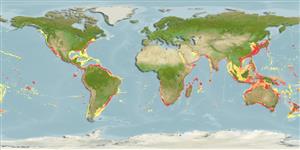Common names from other countries
>
Carangiformes (Jacks) >
Carangidae (Jacks and pompanos) > Naucratinae
Etymology: Seriola: Latin word diminutive with the meaning of a large earthenware pot (Ref. 45335).
More on author: Valenciennes.
Issue
Junior synonyms Seriola aureovittata Temminck and Schlegel, 1845 (in Japan, Northwest Pacific) and Seriola dorsalis (Gill, 1863) (in California, Pacific Baja, and the Gulf of California, Mexico; Northeast Pacific ) are considered valid with Seriola lalandi Valenciennes 1833 confined in Brazil, South Africa, Australia, New Zealand, and Chile (Southern distribution only), according to Martinez-Takeshita et al., 2015 (Ref. 121056).
Environment: milieu / climate zone / depth range / distribution range
بوم شناسي
دريايي; لب شور موجوداتی که در محدوده وسیعی از آبهای آزاد از نزدیک بستر و یا روی کف بستر، در قسمت های میان آبی تا سطح آب و در برخی گونه ها با قابلیت پرواز، زندگی و تغذیه می کنند.; تغييرات عمق 3 - 825 m (Ref. 4517). Subtropical; 18°C - 24°C (Ref. 6390); 55°N - 57°S, 180°W - 180°E
Circumglobal in subtropical waters: Series of disjunct populations. Indo-Pacific: South Africa, Walter Shoals, Amsterdam Island, Japan, Australia, New Zealand, New Caledonia, Hawaii, Rapa, Pitcairn Island, and Easter Island. Eastern Pacific: British Columbia, Canada to Chile (Ref. 2850), including Desventuradas Is. and Juan Fernández Is. (Ref. 89357). Eastern Atlantic: St. Helena, South Africa (Ref. 7097).
Length at first maturity / Size / Weight / سن
Maturity: Lm ?, range 51 - ? cm
Max length : 250 cm TL جنس نر / بدون خواص جنسي; (Ref. 27865); common length : 80.0 cm TL جنس نر / بدون خواص جنسي; (Ref. 9137); بيشينه وزن گزارش شده: 96.8 kg (Ref. 40637); بيشينه سن گزارش شده: 12 سال ها (Ref. 72462)
خارهاي باله پشتي (کل) : 5 - 6; شعاع نرم باله پشتي (کل) : 33 - 35; خارهاي باله مخرجي: 2 - 3; شعاع نرم باله مخرجي: 20 - 21. The only jack without scutella on the caudal peduncle. Dark blue dorsally and almost white ventrally; with a well defined line of demarcation between the two colors.
Adults are benthopelagic in coastal and oceanic waters, off kelp beds and rocky areas (Ref. 2850), sometimes entering estuaries (Ref. 9563). They are solitary or in small groups and can be found near rocky shores, reefs and islands (Ref. 6390). Schools of juveniles are generally found in offshore waters, often near or beyond the continental shelf (Ref. 27865). They prefer warmer water (18-24°C) although they are occasionally found in cooler water (Ref. 27128). Adults feed on small fish, squid and crustaceans (Ref. 27121). Marketed fresh and salted or dried (Ref. 9283).
Paxton, J.R., D.F. Hoese, G.R. Allen and J.E. Hanley, 1989. Pisces. Petromyzontidae to Carangidae. Zoological Catalogue of Australia, Vol. 7. Australian Government Publishing Service, Canberra, 665 p. (Ref. 7300)
وضعيت در فهرست قرمز IUCN (Ref. 130435)
CITES (Ref. 128078)
Not Evaluated
استفاده انسانی
ماهي گيري – شيلات: ارزش تحاري اندك; آبزي پروري: آزمايشي; ماهي ها ي سرگرم كننده: بله
ابزارها
گزارش های ويژه
بارگيری XML
منابع اينترنتي
Estimates based on models
Preferred temperature (Ref.
115969): 9 - 23, mean 14.9 (based on 1169 cells).
Phylogenetic diversity index (Ref.
82804): PD
50 = 0.5020 [Uniqueness, from 0.5 = low to 2.0 = high].
Bayesian length-weight: a=0.01820 (0.00972 - 0.03408), b=2.93 (2.76 - 3.10), in cm Total Length, based on LWR estimates for this species & (Sub)family-body (Ref.
93245).
Trophic level (Ref.
69278): 4.2 ±0.1 se; based on diet studies.
جهندگی (Ref.
120179): پايين ، كم, كمينه زمان لازم براي دو برابر شدن جمعيت 5/4 – 14 سال (K=0.13; tm=2; tmax=12).
Prior r = 0.28, 95% CL = 0.19 - 0.42, Based on 5 data-limited stock assessments.
Fishing Vulnerability (Ref.
59153): High vulnerability (61 of 100).
Climate Vulnerability (Ref.
125649): Moderate to high vulnerability (50 of 100).
